#disciplinary technology
Text
Kickstarting “The Bezzle” audiobook, sequel to Red Team Blues
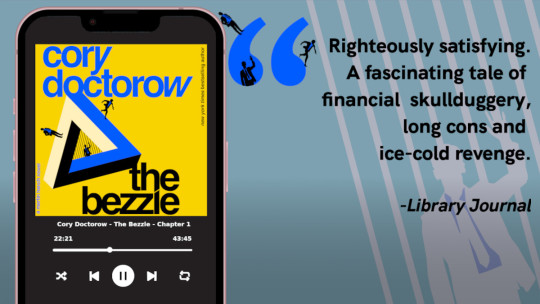
I'm heading to Berlin! On January 29, I'll be delivering Transmediale's Marshall McLuhan Lecture, and on January 30, I'll be at Otherland Books (tickets are limited! They'll have exclusive early access to the English edition of The Bezzle and the German edition of Red Team Blues!).

I'm kickstarting the audiobook for The Bezzle, the sequel to last year's Red Team Blues, featuring Marty Hench, a hard-charging, two-fisted forensic accountant who spent 40 years in Silicon Valley, busting every finance scam hatched by tech bros' feverish imaginations:
http://thebezzle.org
Marty Hench is a great character to write. His career in high-tech scambusting starts in the early 1980s with the first PCs and stretches all the way to the cryptocurrency era, the most target-rich environment for scamhunting tech has ever seen. Hench is the Zelig of tech scams, and I'm having so much fun using him to probe the seamy underbelly of the tech economy.
Enter The Bezzle, which will be published by Tor Books and Head of Zeus on Feb 20: this adventure finds Marty in the company of Scott Warms, one of the many bright technologists whose great startup was bought and destroyed by Yahoo! (yes, they really used that asinine exclamation mark). Scott is shackled to the Punctuation Factory by golden handcuffs, and he's determined to get fired without cause, so he can collect his shares and move onto the next thing.
That's how Scott and Marty find themselves on Catalina island, the redoubt of the Wrigley family, where bison roam the hills, yachts bob in the habor and fast food is banned. Scott invites Marty on a series of luxury vacations on Catalina, which end abruptly when they discover – and implode – a hamburger-related Ponzi scheme run by a real-estate millionaire who is destroying the personal finances of the Island's working-class townies out of sheer sadism.
Scott's victory is bittersweet: sure, he blew up the Ponzi scheme, but he's also made powerful enemies – the kinds of enemies who can pull strings with the notoriously corrupt LA County Sheriff's Deputies who are the only law on Catalina, and after taking a pair of felony plea deals, Scott gets the message and never visits Catalina Island again.
That could have been the end of it, but California's three-strikes law – since rescinded – means that when Scott picks up one more felony conviction for some drugs discovered during a traffic stop, he's facing life in prison.
That's where The Bezzle really gets into gear.
At its core, The Bezzle is a novel about the "shitty technology adoption curve": the idea that our worst technological schemes are sanded smooth on the bodies of prisoners, mental patients, kids and refugees before they work their way up the privilege gradient and are inflicted on all of us:
https://pluralistic.net/2023/04/12/algorithmic-wage-discrimination/#fishers-of-men
America's prisons are vicious, brutal places, and technology has only made them worse. When Scott's prison swaps out in-person visits, the prison library, and phone calls for a "free" tablet that offers all these services as janky apps that cost ten times more than they would on the outside, the cruelty finds a business model.
Working inside and outside the prison Marty Hench and Scott Warms figure out the full nature of the scam that the captive audience of prisoners are involuntary beta-testers for, and they discover a sprawling web of real-estate fraud, tech scams, and offshore finance that is extracting fortunes from the hides of America's prisoners and their families. The criminals who run that kind of enterprise aren't shy about fighting for what they've got, and they're more than happy to cut some of LA County's notorious deputy gangs in for a cut in exchange for providing some kinetic support for the project.
The Bezzle is exactly the kind of book I was hoping I'd get to write when I kicked off the Hench series – one that decodes the scam economy, from music royalties to prison videoconferencing, real estate investment trusts to Big Four accounting firm bogus audits. It's both a fast-moving, two-fisted crime novel and a masterclass on how the rich and powerful get away with both literal and figurative murder.
It's getting a big push from both my publishers and I'll be touring western Canada and the US with it. The early reviews are spectacular. But despite all of this, I had to make my own audiobook for it, which I'm pre-selling on Kickstarter:
http://thebezzle.org
Why? Because Audible – Amazon's monopoly gatekeeper to the audiobook world, with more than 90% of the market – refuses to carry my work.
Audible uses Digital Rights Management to lock every audiobook they sell to their platform. Legally, only an Audible-authorized app can decrypt and play the audiobooks they sell you. Distributing a tool that removes Audible DRM is a felony under Section 1201 of the 1998 DMCA.
That means that if you break up with Audible – delete your Audible apps – you will lose your entire audiobook library. And the fact that you're Audible's hostage makes the writers you love into their hostages, too. Writers understand that if they leave the Audible platform, their audience will have to choose between following them, or losing all their audiobooks.
That's how Audible gets away with abusing its performers and writers, up to and including the $100m Audiblegate wage-theft scandal:
https://www.audiblegate.com/
Audible can steal $100m from its writers…and the writers still continue to sell on the platform, because leaving will cost them their audience.
This is canonical enshittification: lock in users, then screw suppliers. Lots of companies abuse DRM to do this, but none can hold a candle to Amazon, who understand that the DMCA is a copyright law that protects corporations at the expense of creators.
Under DMCA 1201 commercial distribution of a "circumvention device" carries a five-year prison sentence and a $500,000 fine. That means that if I write a book, pay to have it recorded, and then sell it to you through Audible, I am criminally prohibited from giving you the tool to take it from Audible to another platform. Even though I hold the copyright to that work, I would face a harsher sentence than you would if you simply pirated the audiobook from some darknet site. Not only that: if you shoplifted the audiobook in CD form, you'd get a lighter sentence than I, the copyright holder, would receive for giving you a tool to unlock it from Amazon's platform! Hell, if you hijacked the truck that delivered the CD, you'd get off lighter than I would. This is a scam straight out of a Marty Hench novel.
This is batshit. I won't allow it. My books are licensed on the condition that they must not be sold with DRM. Which means that Audible won't sell my books, which means that my publishers are thoroughly disinterested in paying thousands of dollars to produce audiobooks of my titles. A book that isn't sold in the one store than accounts for 90% of all sales is unlikely to do well.
That's where you come in. Since 2020, I've used Kickstarter to pre-sell five of my audiobooks (I wrote nine books during lockdown!). All told, I've raised over $750,000 (gross! but still!) on these crowdfunders. More than 20,000 backers have pitched in! The last two of these books – The Internet Con and The Lost Cause – were national bestsellers.
This isn't just a way for me to pay off a lot of bills and put away something for retirement – it's proof that readers care about supporting writers and don't want to be locked in by a giant monopolist that depends on its drivers pissing in bottles to make quota.
It's a powerful message about the desire for something better than Amazon. It's part of the current that is driving the FTC to haul Amazon into court for being a monopolist, and also part of the inspiration for other authors to try treating Amazon as damage and routing around it, with spectacular results:
https://www.kickstarter.com/projects/dragonsteel/surprise-four-secret-novels-by-brandon-sanderson

And I'm doing it again. Last December, I went into Skyboat Media's studios where Gabrielle De Cuir directed @wilwheaton, who reprised his role as Marty Hench for the audiobook of The Bezzle. It came out amazing:
https://archive.org/details/bezzle-sample
Now I'm pre-selling this audiobook, as well as the ebook and hardcover for The Bezzle. I'm also offering bundles with the ebook and audiobook for Red Team Blues (naturally these are all DRM-free). You can get your books signed and personalized and shipped anywhere in the world, courtesy of Book Soup, and I've partnered with Libro.fm to deliver DRM-free audiobooks with an app for people who don't want to mess around with sideloading.
I've also got some spendy options for high rollers. There's three chances to name a character in the next Hench novel (Picks and Shovels, Feb 2025). There's also five chances to commission a Hench short story about your favorite tech scam, and get credited when the story is published.
The Kickstarter runs for the next three weeks, which should give me time to get the hardcopy books signed and shipped to arrive around the on-sale date. What's more, I've finally worked out all the post-Brexit kinks with shipping my UK publisher's books to EU backers. I'm working with Otherland Books to fulfill those EU orders, and it looks like I'm going to be able to sign a giant stack of those when I'm in Berlin later this month to give the annual Marshall McLuhan lecture at the Canadian embassy:
https://transmediale.de/en/2024/event/mcluhan-2024
Red Team Blues and its sequels are some of the most fun – and informative – work I've done in my quarter-century career. I love how they blend technical explanations of the scam economy with high-intensity technothrillers. That's the the same mix as my bestselling YA series Little Brother series – but these are firmly adult novels.
The Bezzle came out great. I hope you'll give it a try – and that you'll come out to see me in late February when I hit the road with the book! Here's that Kickstarter link again:
http://thebezzle.org

If you'd like an essay-formatted version of this post to read or share, here's a link to it on pluralistic.net, my surveillance-free, ad-free, tracker-free blog:
https://pluralistic.net/2024/01/10/the-bezzle/#marty-hench
#pluralistic#kickstarter#audible#the bezzle#bezzles#prison tech#disciplinary technology#crowdfunding#wilw#wil wheaton#audiobooks#publishing#science fiction#marty hench#martin hench#red team blues#shitty technology adoption curve#reits
661 notes
·
View notes
Text
ajin is so good on so many levels but i am particularly interested in the philosophical and ethical implications it raises from the doing away with death
#ITS SO GOOD RRR#something i might actually want to write about#as a warmup. or practice#but grrr ajin and its many implications#its the perfect intersection of everything i care abt#medicine - research meta - security - ontology - ethics - public health - interpersonal relations - technology - law/policy - media#like at its core its a very action oriented manga but i think the questions it raises is a lot more interesting than anything#ajin as a very complex thought experiment from many disciplinary angles#pleasr talk to me if u have any thoughts 🙏#ajin#or like. r interested in seeing this happen from me#annoying philosophy guys gotta write
11 notes
·
View notes
Text
Multi-disciplinary panels to discuss research that advances Toward Science Without Walls.
AAAS is committed to making the Annual Meeting an inclusive space for sharing ideas and knowledge. See our meeting policies and help us foster a safe space for all. Follow the conversations with the hastags #AAASmtg
2024 AAAS Annual Meeting takes place in Denver, CO, February 15-17. Plenary sessions and Sci-Mic Stage Chats will be streamed live. See schedule and tune in!
Annual Meeting program
Scientific Sessions: Science and technology experts assemble in small multi-disciplinary panels to discuss research that advances Toward Science Without Walls. During these 60-minute sessions, a panel of three speakers give 10-minute presentations followed by audience questions and comments.
Lightning Talks: Early career researchers take the stage for ten minutes to discuss their STEM work.
Workshops: Workshops are aimed at individuals seeking careers in science and engineering. Workshops are instructional and interactive in nature and are markedly different from a scientific session. Workshops may have up to 3 presenters and will be 60 minutes in length.
SCIENTIFIC SESSION, WORKSHOP, AND LIGHTNING TALK TIMELINE
March 5; 2024 theme is announced, and session submission site opens.
May 4; Deadline to propose Scientific Sessions, Workshop, and Lighting Talks.
May 15; Session proposal review begins with volunteer session reviewers.
July; Program Committee meets for the final review to select Scientific Sessions, Workshop, and Lighting Talks.
Mid-August; Scientific Session and Lightning Talk organizers receive accept/decline notifications.
Mid-August; Workshop coordinators receive accept/decline notifications.
Mid-October; 2023 Annual Meeting program and registration available online.
February 16-17; Scientific Sessions, Workshop, and Lighting Talks take place at the 2024 AAAS Annual Meeting.
The session and workshop timeline is updated as of September 13, 2023.
#science and technology#scientific research#precision medicine#scientists#medical sciences#annual meeting#aaas#Scientific Sessions#Workshop#lighting talks#Science Without Walls#workshops#multi-disciplinary panels
0 notes
Text
I LOVE SCHOOL!!!! I'm reading a paper for philosophy that's talking about how we learn and quite literally THINK about things (like as in cognitive science) and it was explaining how neurons work and im like "whoa hey that looks like physics!" so I send some of it over to my bf (physics major) and he's like "this is literally machine learning I learned this doing research assistance last year" and then explains how neural networks work and im like "whoa thats so cool!!!" And then lo and behold the next 5 pages of the paper are just explaining how neural networks work for AI
#inter disciplinary connections???? NO WAY!!!#also i did not realize AI and machine learning like we have today started to long ago#like this paper is from the mid 90s i think#i thought this stuff would be from around mid 2000s#i guess thats what happens to your understanding of technology when its developed before you are born LOOOOL
0 notes
Text
Dc x DP Prompt #8: Best Friend’s Brother
Preface: this prompt can be used with different characters but I’m writing it as Dead on Main bc that’s my favorite. Also the colleges I mention are real colleges from the DCU
~~~
Danny Fenton was 18 when he moved to Gotham for college.
It was the only place with a half decent engineering program that would take a kid with his record; drop in grades, unexplained absences, missing class, a disciplinary record, etc. Plus there was a decent saturation of both magic and ectoplasm in Gotham’s air. After he got accepted he decided to tell his parents he was Phantom. They reacted surprisingly well all things considered. They were horrified to learn they’d been hunting their son but it quickly turned into acceptance to listen to what he had to tell them. Now they turned their obsession from hunting ghosts to learning more about ghost more humanely. He also managed to get his former rouges to agree to call off any major shenanigans in favor of less destructive outlets. (He got Ember a TikTok and a YouTube channel, he set up a drag racing circuit in the realms for Johnny and Kitty, let Technus enter the internet as long as he stayed within Amity’s grid or help Ember manage her stuff, allowed Desiree grant wishes for Make a Wish Foundation kids so long as she didn’t horribly twist them, etc.)
Now with the town not at constant risk of danger and his parents agreeing to really handle any rouge ghosts, Danny could leave Amity with a clear conscience. His friends were also growing up and heading to their own colleges. Tucker was heading to Ivy University in New England, which rivaled MIT in terms technological prestige, and Sam decided on Vandermeer University in Pittsburg, which had a reputation for being a very liberal, anti-authority campus. Although their trio would be spread out, Danny found comfort in the fact that they’d all moved from the Midwest to the Northeast.
With promises to stay in touch a visit. Danny got set up in GCU’s dorms, ready to move into the next chapter of his life.
~
Danny Fenton was 20 when Tim Drake (age 19 but nearing 20) officially became one of his best friends.
They had been introduced to each other by their mutual friend Sebastian Ives for a new Warlocks and Warriors campaign. Their friendship extended beyond WnW when they ended up on the same Applied Physics and Mechanics class. It was cemented when they got pair up for a project in class and had to spend lots of time around each other.
Danny didn’t mind that Tim tended to be a bit flaky and Tim didn’t mind that Danny was possibly not 100% human. They didn’t ask each other too many questions about that stuff. They knew the other had something odd about him and that was fine with them. It was nice to have a causal friend they could be normal with, without being questioned about their more peculiar behaviors.
They officially became best friends when the built a Rube Goldberg machine with a working trebuchet within an hour of the three they had to complete it for their Applied Phys-Mech final. Danny introduced Tim to Sam, Tucker and Jazz. Tim introduced him to Steph, Tam, and Cass. They texted and hung out fairly often. They truly did consider each other one their best friends.
~
Danny Fenton is 22 when he meets Tim’s family.
Tim’s 21st birthday is coming up and he has plans with his family the day of and is going out with his friends, including a couple from out of town, that night. They want to take him out for his first drink and it’s fortunate timing since it’s the weekend so nobody has to worry about classes. Everyone who was going was already informed that Tim would be spending most of the day with his family before Steph and Cass would bring to the club everyone was meeting up at. Which is why it’s purely a coincidence when he runs into them at BatBurger during the lunch rush.
Danny had just picked up the part-time job to earn a little extra cash to pay for his hobbies. Tim new about it but didn’t know the exact location he worked. That’s why they were both presently surprised when they heard each others voices in the drive through. When they pulled up to window Danny saw his friend leaning over a tired looking black-haired man, trying to stick his head out of the drivers window to give Danny a maniacal grin.
He quickly introduced the other passengers of the car as his dad, Bruce, and three of his brothers Dick, Jason, and Duke. He mentioned he had a fourth brother, Damian, who was still at home. Danny couldn’t really see everyone all that well on account of they were inside a car but he happily greeted them as well. They laughed and Danny wished Tim a happy birthday saying he’d see him at his celebration later tonight before handing them their food. He could the rowdy boys ribbing their brother as the car drove away and Danny resumed his work.
That incident seemed to have opened a gate because now Tim felt more comfortable inviting him over when his brothers were still around the house. He occasionally talked about his family more and Danny returned the favor letting snippets of his own family spill a little more. Occasionally, he’d see Tim’s family outside of his interactions with Tim.
He’d run into Damian, and sometimes Bruce or Dick was with him, at the museum or in the park while the younger had been walking his dog and stopped to say hi a couple of times. He chatted with Dick a couple of times when they were both in line to get coffee at a cafe. He saw Duke on a college tour once and waved at him.
The family member he probably saw the most other that Tim (and by extension Cass) was actually Jason. He’d ended up ditching BatBurger to get some more practical experience at an apprenticeship at the auto shop Jason went to to get his motorcycle serviced. The two of them got along pretty well and would often make conversation when Jason was waiting on his bike to be ready or to get his bill.
At first is was small talk about little things like how he and Tim were doing in class or how their days were going but they soon grew to have genuine interests in each other. Jason let Danny talk about space and mechanics and even gave his own thoughts sometimes, once helping Danny realize he was over complicating the circuit board of the device he was building. In return Danny let Jason ramble to him about literature, even taking the initiative to read a book Jason mentioned so he could talk to him about it better. Their conversation tended to be on the briefer side but were always enjoyable to both parties.
Danny actually liked being around Jason a lot but didn’t really bring that fact up a lot around Tim as it didn’t seem necessary. Tim was pretty glad that Danny got along with his family but he preferred to keep them in separate places in his mind. Danny knew and respected that, only really mentioning that he’d seen them recently and that they’d told him to say hi on their behalf (or die in Damian’s case occasionally).
~
Tim Drake was 22 when he came to a horrific realization.
Well, perhaps horrific was a bit of an exaggeration. Tim wasn’t necessarily horrified by the revelation. In all honesty he didn’t know how to feel. He felt an odd mixture of protectiveness, possessiveness, confusion, and optimism(?).
You see, Tim and Danny had been hanging out in the campus center, studying and goofing off when he got a text from Jason saying he was coming to pick him up for family dinner at the manor since he was closest and Dick was busy picking up Duke and Damian from their after school clubs.
“What’s up?” Danny asked him curiously.
Tim set his phone on the table and started putting his stuff away. “My brother is coming to pick me up for family dinner so I gotta head out soon.”
“Ah well I should probably get going too. Tell Dick I said hi.”
“Actually, it’s Jason. Dick is picking up Duke and Damian,” he said shoving his textbook into his bag.
“Oh? That’s nice of him. Hey do you wanna just head out together?” Danny asked, fidgeting with his hoodie strings.
Tim noticed a slight strain in Danny’s voice at the mention of Jason but didn’t comment. He just nodded his head sure and walked outside with Danny. They got out to the street when Tim realized he’d left his phone in the library. He faced palmed and asked Danny if he could hold his stuff so it wouldn’t slow him down as he ran back to the campus center to get his phone. Danny agreed to and hold his stuff and wait for Jason while Tim went back.
After getting his phone Tim started heading back to where he left Danny when he saw that Jason had arrived that Jason had arrived and was talking to Danny. He was about to call out to them when he noticed several things in quick succession. Danny was fidgeting with his hoodie, something he tended to do when nervous. The tips of Danny’s ears were a light shade of pink (it isn’t cold out yet?). Danny looked deeply absorbed in his conversation with Jason in a way that reminded Tim of how he talked about space. And Jason seemed just as absorbed in the conversation as well.
The gears in Tim’s head went into overdrive and he realized ‘Ah- Danny has a crush on Jason’. His eyes widened as his head whipped around to examine Jason again. He saw a look of genuine fondness in his eyes. Thus Tim was confronted with the aforementioned horrific realization and complicated feelings. Tim didn’t know whether to laugh, cry, or both.
‘My dumbass best friend has a crush on my brother. And worse(?), my idiot brother returns those feelings.’
#dc x dp#long post#dead on main#danny fenton#tim drake#jason todd#jason todd x danny fenton#danny and tim are bffs#Danny has a crush on his best friends older brother#he hasn’t realized this quite yet#Tim isn’t sure how to feel about this#Jason probably likes Danny too but also doesn’t realize it#Tim is the only one who is aware and suffering#he has to make a choice:#wingman his idiot friend and idiot brother#or hoard his friend to himself#Strega’s dc x dp prompt
1K notes
·
View notes
Photo

Explore TDU University that was established as an innovation centred University. Know more about the courses, admissions, infrastructure etc. Check out now!
#tdu#tdu courses#tdu fees#tdu university#the university of trans disciplinary health sciences and technology
0 notes
Note
hello! im just finishing up my read of structures of scientific revolutions, which has genuinely been very useful and shifted my understanding of science in a way being around people doing scientific research all day really didn't! i don't have a liberal arts education so i would love to get a sense of (a) what else of the philosophy / history of science canon is worth reading in the original (b) standard review papers or introductory textbooks and (c) critiques of the canon. i understand this is a big ask ofc, so feel free to point me to good depts / syllabi from good courses. thanks :)
yessss such a fun question >:) so, the thing that was so great about 'the structure of scientific revolutions', which i'm sure you've picked up on, is that kuhn pushed historians and philosophers of science to challenge the positivist model of science as a linearly progressive search to 'accumulate knowledge'. the idea of a 'paradigm shift' was itself a paradigm shift at the time; it was an early example of a language for talking about radical change in science without giving into the assumption that change necessarily = 'progress' (defined by national interests, mathematisation, and so forth). this is still an approach that's foundational to history and philosophy of science; it's now taken as so axiomatic that few academics even bother to gloss or defend it in monographs (which raises its own issue with public communication, lol).
where kuhn falls apart more (and this was typical for a philosopher of his era, training, and academic milieu) is in the fact that he never developed any kind of rigorous sociological analysis of science (despite alluding to such a thing being necessary) and you probably also noticed that he makes a few major leaps that indicate he's not fully committed to thinking through the relationship between science and politics. so for example, we might ask, can a paradigm shift ever occur for a reason other than a discovered 'anomaly' that the previous paradigm can't account for? for instance, how do political investments in science and scientific theories affect what's accepted as 'normal science' in a kuhnian sense? are there historical or present cases where a paradigm didn't change even though it persistently failed to explain certain empirical observations or data? what about the opposite, where a paradigm did change, but it wasn't necessarily or exclusively because the new paradigm was a 'better' explanation scientifically? how do we determine what makes an explanation 'better', anyway, especially given that kuhn himself was very much invested in moving beyond the naïve realist position? and on the more sociological side, we can raise issues like: say you're a scientist and you legitimately have discovered an 'anomaly'. how do you communicate that to other scientists? what mechanisms of knowledge production and publication enable you to circulate that information and to be taken seriously? what modes of communication must you use and what credentials or interpersonal connections must you have? what factors cause theories and discoveries to be taken more or less seriously, or adopted more or less quickly, besides just their 'scientific utility' (again, assuming we can even define such a thing)?
again, this is not to shit on kuhn, but to point out that both history and philosophy of science have had a lot of avenues to explore since his work. note that there are a few major disciplinary distinctions here, each with many sub-schools of thought. a 'science and technology studies' or STS program tends to be a mix of sociological and philosophical analysis of science, often with an emphasis on 'technoscience' and much less on historical analysis. a philosophy of science department will be anchored more firmly in the philosophical approach, so you'll find a lot of methodological critique, and a lot of scholarship that seeks to tackle current aporias in science using various philosophical frameworks. a history of science program is fundamentally just a sub-discipline of history, and scholarship in this area asks about the development of science over time, how various forms of thinking came into and out of favour, and so forth. often a department will do both history and philosophy of science (HPS). historians of medicine, technology, and mathematics will sometimes (for arcane scholastic reasons varying by field, training, and country) be anchored in departments of medicine / technology / mathematics, rather than with other faculty of histsci / HPS. but, increasingly in the anglosphere you'll see departments that cover history of science, technology, and mathematics (HSTM) together. obviously, all of these distinctions say more about professional qualifications and university bureaucracy than they do about the actual subject matter; in actuality, a good history of science should virtually always include attention to some philosophical and sociological dimensions, and vice versa.
anyway—reading recs:
there are two general reference texts i would recommend here if you just want to get some compilations of major / 'canonical' works in this field. both are edited volumes, so you can skip around in them as much as you want. both are also very limited in focus to, again, a very particular 'western canon' defined largely by trends in anglo academia over the past half-century or so.
philosophy of science: the central issues (1998 [2013], ed. martin curd & j. a. cover). this is an anthology of older readings in philsci. it's a good introduction to many of the methodological questions and problems that the field has grown around; most of these readings have little to no historical grounding and aren't pretending otherwise.
the cambridge history of science (8 vols., 2008–2020, gen. eds. david c. lindberg & ron numbers). no one reads this entire set because it's long as shit. however, each volume has its own temporal / topical focus, and the essays function as a crash-course in historical methodology in addition to whatever value you derive from the case studies in their own right. i like these vols much more than the curd & cover, but if you really want to dig into the philosophical issues and not the histories, curd & cover might be more fun.
besides those, here are some readings in histsci / philsci that i'd recommend if you're interested. for consistency i ordered these by publication date, but bolded a few i would recommend as actual starting points lol. again some of these focus on specific historical cases, but are also useful imo methodologically, regardless of how much you care about the specific topic being discussed.
Robert M. Young. 1969. "Malthus and the Evolutionists: The Common Context of Biological and Social Theory." Past & Present 43: 109–145.
David Bloor. 1976 [1991]. Knowledge and Social Imagery. Chicago: University of Chicago Press (here is a really useful extract that covers the main points of this text).
Ian Hacking. 1983. Representing and Intervening: Introductory Topics in the Philosophy of Natural Science. Cambridge: Cambridge University Press.
Steven Shapin. 1988. “Understanding the Merton Thesis.” Isis 79 (4): 594–605.
Steven Shapin and Simon Schaffer. 1989. Leviathan and the Air-Pump: Hobbes, Boyle, and the Experimental Life. Princeton, NJ: Princeton University Press.
Mario Biagioli. 1993. Galileo, Courtier: The Practice of Science in the Culture of Absolutism. Chicago: University of Chicago Press.
Bruno Latour. 1993. The Pasteurization of France. Translated by Alan Sheridan and John Law. Cambridge, MA: Harvard University Press.
Margaret W. Rossiter. 1993. “The Matthew Matilda Effect in Science.” Social Studies of Science 23 (2): 325–41.
Andrew Pickering. 1995. The Mangle of Practice. Chicago: University of Chicago Press.
Porter, Theodore M. Trust in Numbers: The Pursuit of Objectivity in Science and Public Life. Princeton University Press, 1996.
Peter Galison. 1997. “Trading Zone: Coordinating Action and Belief.” In The Science Studies Reader, edited by Mario Biagioli, 137–60. New York: Routledge.
Crosbie Smith. 1998. The Science of Energy: A Cultural History of Energy Physics in Victorian Britain. Chicago: University of Chicago Press.
Chambers, David Wade, and Richard Gillespie. “Locality in the History of Science: Colonial Science, Technoscience, and Indigenous Knowledge.” Osiris 15 (2000): 221–40.
Kuriyama, Shigehisa. The Expressiveness of the Body and the Divergence of Greek and Chinese Medicine. Zone Books, 2002.
Timothy Mitchell. 2002. Rule of Experts: Egypt, Techno-Politics, Modernity. Berkeley: University of California Press.
James A. Secord. 2003. Victorian Sensation: The Extraordinary Publication, Reception, and Secret Authorship of Vestiges of the Natural History of Creation. Chicago: University Of Chicago Press.
Sheila Jasanoff. 2006. “Biotechnology and Empire: The Global Power of Seeds and Science.” Osiris 21 (1): 273–92.
Murphy, Michelle. Sick Building Syndrome and the Problem of Uncertainty: Environmental Politics, Technoscience, and Women Workers. Duke University Press, 2006.
Kapil Raj. 2007. Relocating Modern Science: Circulation and the Construction of Knowledge in South Asia and Europe, 1650–1900. New York: Palgrave Macmillan.
Schiebinger, Londa L. Plants and Empire: Colonial Bioprospecting in the Atlantic World. Harvard University Press, 2007.
Galison, Peter. “Ten Problems in History and Philosophy of Science.” Isis 99, no. 1 (2008): 111–24.
Daston, Lorraine, and Peter Galison. Objectivity. Zone Books, 2010.
Dipesh Chakrabarty. 2011. “The Muddle of Modernity.” American Historical Review 116 (3): 663–75.
Forman, Paul. “On the Historical Forms of Knowledge Production and Curation: Modernity Entailed Disciplinarity, Postmodernity Entails Antidisciplinarity.” Osiris 27, no. 1 (2012): 56–97.
Ashworth, William J. 2014. "The British Industrial Revolution and the the Ideological Revolution: Science, Neoliberalism, and History." History of Science 52 (2): 178–199.
Mavhunga, Clapperton. 2014. Transient Workspaces: Technologies of Everyday Innovation in Zimbabwe. Cambridge, MA: MIT Press.
Lynn Nyhart. 2016. “Historiography of the History of Science.” In A Companion to the History of Science, edited by Bernard Lightman, 7–22. Chichester, UK: Wiley Blackwell.
Rana Hogarth. 2017. Medicalizing Blackness: Making Racial Difference in the Atlantic World, 1780–1840. Chapel Hill: University of North Carolina Press.
Suman Seth. 2018. Difference and Disease: Medicine, Race, and the Eighteenth-Century British Empire. Cambridge, UK: Cambridge University Press.
Aro Velmet. 2020. Pasteur's Empire: Bacteriology and Politics in France, its Colonies, and the World. Oxford: Oxford University Press.
i would also say, as a general rule, these books are generally all so well-known that there are very good book reviews and review essays on them, which you can find through jstor / your library's database. these can be invaluable both because your reading list would otherwise just mushroom out forever, and because a good review can help you decide whether you even need / want to sit down with the book itself in the first place. literally zero shame in reading an academic text secondhand via reviews.
399 notes
·
View notes
Note
I feel like not only do people seem to be ignorant that the U.S. military preys on autistics, there are a lot of people that actively deny this. Having been in the military I can say that the recruiting tactics were laser focused at exploiting my (undiagnosed, even to this day) autism. They really played on the things about military life that were soothing to my autistic brain. Twisting service to seemingly align with the autistic sense of justice, emphasizing the routine, talking up cool technology that you could use, emphasizing the "fairness" in promotions. I was in nuclear power and the majority of my training class (including myself) was visibly autistic in some way, but even after a disciplinary action had me in a training program not selecting for high ASVAB scores, there were so many autistics around.
Are you aware of any writing about this, because as hinted at above the last time I looked into this, I could really only find posts from people asking about whether the military does this (it do) which then got tonnes of responses of "no, of course not they don't even let autistic people in" and articles advocating for letting diagnosed autistics in the military (fuck that). I'd probably try to write something if I were openly autistic or openly a veteran, but I'm only engaged with autistic advocacy and support offline for safety and I'm too ashamed of my military service to discuss it openly.
Anyway I got out after a failed suicide attempt after I was maltreated in therapy (a trend that continued until I swore off the institution of therapy in college,) which I was sent to because I was having frequent panic attacks because of my growing awareness of the evil I was participating in.
Pat Loller is working on a memoir about his military service that touches pretty strongly on this. I'd look into his comedy and TikTok videos for now. And James Finn has told me very similar things to what you are saying -- you've probably read his interview in my book, but he writes on Medium and you might find little details about his military service and how it relates to his Autism there from time to time, too. It's a sadly underexplored topic, still. We need more people telling these stories, but it's also profoundly triggering and draining to do.
65 notes
·
View notes
Text
The "Golden Child" Headcanon (Glamrock Freddy)
Something I've constantly based my interpretation of Freddy on is him being the golden child of Glamrock era. (Mixed with the pyromaniac Freddy hc)
For those curious, golden child syndrome is "One who is favored or the favorite (in a family, on a team, at work, etc.), often held in high esteem by others, and for whom there are high hopes"
I thought it fit him pretty well. It's not canon. It's my hc/portrayal of him... with no Michael Afton influence involved.
Enjoy
____________________________________________
Fazbear Entertainment have always been under fire for the decades of failed franchises and establishments, following the grizzly tales of child murders, conspiracy, and corporate corruption. Along with technological malpractice, injuries, negligence and many other violations under the sun.
With the new Mega Pizzaplex underway, they might as well have slapped a new coat paint against the many dozen layers of past mistakes.
The well known iterations of Freddy Fazbear have always shifted through the times, but he's the face of the company, so it's great to make him both recognizable and a role model for all children. Every Freddy that's been made almost had a paternal facet to them, some more than others.
Glamrock Freddy was no different, only rocking the glamrock aesthetic and based on the late singer Freddie Mercury.
His design was simple yet his build was far more advanced than any of his predecessors, and due to the company's tendency of shrouding the past, they wanted to make him even more inviting.
The usual coding followed a similar format with permanent traits:
Optimistic, passive, charismatic, and committed, to name a few.
These traits are what made Glamrock Freddy “Freddy Fazbear”, or at least a modern version of him.
The company wanted these traits to be followed to a T, not wanting incidents from the past occurring the same way. While they wanted their other glamrock stars to strive, their focus on the main attraction caused some shortcomings in managing the cast.
Overlooking some programming errors and disregarding the less than desirable traits given to the other mascots.
Because of their fixation on Freddy, the others suffered.
The company perfected Freddy's programming and wanted nothing but that from him. Anything less would result in disciplinary measures or “bug fixes” to make sure he knew how to work properly.
Freddy's optimism was overbearing to the point that it felt unnatural and forced. His general disposition was the friendly front man, but in the confines of his room, he was aware of his lack of independence.
Some companions, like Chica and Bonnie, although we're programmed relationships, he leaned on them as his lifeline. Most of his bandmates meant a lot to him, as they were all made under the same creators that have each of them life and sentience.
Seeing children happy was another thing that kept him going, knowing he was created specifically for the joy of children.
However, a single mistake or flaw in a performance could cause him to internally spiral and shut down. When that happens, Freddy retreats to a charging station or his greenroom to contemplate his actions. Even when nothing happened, he couldn't help but be rattled, on edge knowing that the higher ups were always watching. All eyes were on him after all. Not a single slip up should be happening, not when he was a perfect machine created to make people happy.
His hyperactivity and drive to keep guest spirits up would mess up his battery charge, leading to more needed breaks. But that wasn't something he needed, he just needed to keep working.
Because what good would he be if he wasn't striving to work harder to make others happy.
#...hhmm..#a lot of angst material in here#if i made a fic series around his struggles i would in a heart beat#glamrock freddy#fnaf headcanons#fnaf security breach
25 notes
·
View notes
Text
by Dion J. Pierre
The groups noted that in Nov., Alexandra Orbuch, a writer for The Princeton Tory, a conservative student publication, was assaulted by a male member of Students for Justice in Palestine (SJP) while filming a protest the group held on campus. The man allegedly followed Orbuch to obstruct her efforts, eventually stepping on her foot and pushing her. When Orbuch complained to a nearby public safety officer, the officer told her that she had “incited something.”
Despite the gendered nature of the assault —an issue Princeton has dedicated an entire office to dealing with — the university granted the male student a no-contact oder against Orbuch, explaining that any reporting she published which alluded to him would be considered a violation of the order and result in disciplinary charges. A similar incident occurred in 2022, when Tory reporter Danielle Shapiro attempted to report on the Princeton Committee on Palestine. After being notified of the order, Shapiro was told refer to a “Sexual Misconduct & Title IX” webpage, according to a guest column she wrote in the Wall Street Journal.
“This is at least the second time in the last two years that a Tory student journalist has been silence by a no-contact order at the behest of community members offended by his or her pro-Israel journalism,” Thursday’s letter continued. “This systematic weaponization of no-contact orders to silence pro-Israel journalism — or any journalism — cannot stand.”
The incidents involving Orbuch and Shapiro are two of numerous examples of universities subjecting conservative and pro-Israel campus community members to reputational smearing and denying them the same rights and protections as progressives and pro-Palestinian advocates. The issue has drawn attention from Congress, whose House of Representatives Committee on Education and the Workforce is investigating whether universities such as Harvard University, University of Pennsylvania, and Massachusetts Institute of Technology (MIT) employed a self-serving interpretation of the US Constitution to avoid punishing students who committed antisemitic discrimination and harassment.
#the princeton tory#princeton university#danielle shapiro#alexandra orbuch#students for justice in palestine
40 notes
·
View notes
Text
Wellness surveillance makes workers unwell
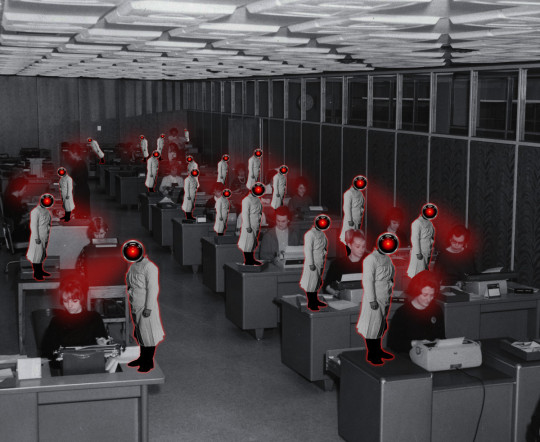
I'm on tour with my new, nationally bestselling novel The Bezzle! Catch me in TORONTO on Mar 22, then with LAURA POITRAS in NYC on Mar 24, then Anaheim, and more!

"National conversation" sounds like one of those meaningless buzzphrases – until you live through one. The first one I really participated in actively was the national conversation – the global conversation – about privacy following the Snowden revelations.
This all went down when my daughter was five, and as my wife and I talked about the news, our kid naturally grew curious about it. I had to literally "explain like I'm five" global mass surveillance:
https://locusmag.com/2014/05/cory-doctorow-how-to-talk-to-your-children-about-mass-surveillance/
But parenting is a two-way street, so even as I was explaining surveillance to my kid, my own experiences raising a child changed how I thought about surveillance. Obviously I knew about many of the harms that surveillance brings, but parenting helped me viscerally appreciate one of the least-discussed, most important aspects of being watched: how it compromises being your authentic self:
https://www.theguardian.com/technology/blog/2014/may/09/cybersecurity-begins-with-integrity-not-surveillance
As I wrote then:
There are times when she is working right at the limits of her abilities – drawing or dancing or writing or singing or building – and she catches me watching her and gets this look of mingled embarrassment and exasperation, and then she changes back to some task where she has more mastery. No one – not even a small child – likes to look foolish in front of other people.
Learning, growth, and fulfillment all require a zone of privacy, a time and place where we are not observed. Far from making us accountable, continuous, fine-grained surveillance by authority figures just scares us into living a cramped, inauthentic version of ourselves, where growth is all but impossible. Others have observed the role this plays in right-wing culture war bullshit: "an armed society is a polite society" is code for "people who make me feel uncomfortable just by existing should be terrorized into hiding their authentic selves from me." The point of Don't Say Gay laws and anti-trans bills isn't to eliminate gender nonconformity – it's to drive it into hiding.
Given all this, it's no surprise that workers who face workplace surveillance in the name of "wellness" feel unwell as a result:
https://www.ifow.org/publications/what-impact-does-exposure-to-workplace-technologies-have-on-workers-quality-of-life-briefing-paper
As the Future of Work Institute found in its study, some technologies – systems that make it easier to collaborate and communicate with colleagues – increase workers' sense of wellbeing. But wearables and AI tools make workers feel significantly worse:
https://assets-global.website-files.com/64d5f73a7fc5e8a240310c4d/65eef23e188fb988d1f19e58_Tech%20Exposure%20and%20Worker%20Wellbeing%20-%20Full%20WP%20-%20Final.pdf
Workers who reported these negative feelings confirmed that these tools make them feel "monitored." I mean, of course they do. Even where these tools are nominally designed to help you do your job better, they're also explicitly designed to help your boss keep track of you from moment to moment. As Brandon Vigliarolo writes for The Register, these are the same bosses who have been boasting to their investors about their plans to fire their workers and replace them with AI:
https://www.theregister.com/2024/03/14/advanced_workplace_tech_study/
"Bossware" is a key example of the shitty rainbow of "disciplinary technology," tools that exist to take away human agency by making it easier to surveil and control its users:
https://pluralistic.net/2020/07/01/bossware/#bossware
Bossware is one of the stages of the Shitty Technology Adoption Curve: the process by which abusive and immiserating technologies progress up the privilege gradient as their proponents refine and normalize dystopian technologies in order to impose them on wider and wider audiences:
https://pluralistic.net/2021/02/24/gwb-rumsfeld-monsters/#bossware
The kinds of metrics that bossware gathers might be useful to workers, but only if the workers get to decide when, whether and how to share that data with other people. Microsoft Office helps you catch typos by underlining words its dictionary doesn't recognize; the cloud-based, "AI-powered" Office365 tells your boss that you're the 11th-worst speller in your division and uses "sentiment analysis" to predict whether you are likely to cause trouble:
https://pluralistic.net/2022/08/21/great-taylors-ghost/#solidarity-or-bust
Two hundred years ago, Luddites rose up against machines. Contrary to the ahistorical libel you've heard, the Luddites weren't angry or frightened of machines – they were angry at the machines' owners. They understood – correctly – that the purpose of a machine "so easy a child could use it" was to fire skilled adult workers and replace them with kidnapped, indentured Napoleonic War orphans who could be maimed and killed on the job without consequence:
https://pluralistic.net/2023/03/12/gig-work-is-the-opposite-of-steampunk/
A hundred years ago, the "Taylorites" picked up where those mill owners left off: choreographing workers' movements to the finest degree in a pseudoscientific effort to produce a kind of kabuki of boss-pleasing robotic efficiency. The new, AI-based Taylorism goes even further, allowing bosses to automatically blacklist gig workers who refuse to cross picket-lines, monitor "self-employed" call center operators in their own homes, and monitor the eyeballs of Amazon drivers:
https://pluralistic.net/2023/04/12/algorithmic-wage-discrimination/#fishers-of-men
AI-based monitoring technologies dock workers' wages, suspend them, and even fire them, and when workers object, they're stuck arguing with a chatbot that is the apotheosis of Computer Says No:
https://pluralistic.net/2024/01/11/robots-stole-my-jerb/#computer-says-no
There's plenty of research about AI successfully "augmenting" workers, making them more productive and I'm the last person to say that automation can't help you get more done:
https://www.ibm.com/thought-leadership/institute-business-value/en-us/report/augmented-workforce
But without understanding how AI augments class warfare – disciplining workers with a scale, speed and granularity beyond the sadistic fantasies of even the most micromanaging asshole boss – this research is meaningless.
The irony of bosses imposing monitoring to improve "wellness" and stave off "burnout" is that nothing is more exhausting, more immiserating, more infuriating than being continuously watched and judged.

Name your price for 18 of my DRM-free ebooks and support the Electronic Frontier Foundation with the Humble Cory Doctorow Bundle.

If you'd like an essay-formatted version of this post to read or share, here's a link to it on pluralistic.net, my surveillance-free, ad-free, tracker-free blog:
https://pluralistic.net/2024/03/15/wellness-taylorism/#sick-of-spying

Image:
Cryteria (modified)
https://commons.wikimedia.org/wiki/File:HAL9000.svg
CC BY 3.0
https://creativecommons.org/licenses/by/3.0/deed.en
#pluralistic#surveillance#workplace surveillance#disciplinary technology#bossware#taylorism#ai#automation unemployment#wellness#health#labor#parenting#luddism
584 notes
·
View notes
Text
Interview with a Tradgay Beta Male

Can you tell me a little about yourself first?
Sure, I'll tell you a bit about myself. I'm a gay man living a traditional, conservative life, and I prefer to have a monogamous marriage with my husband. My husband is the Alpha male, and I take on the role as the beta male. We strive to live a tradgay life, which involves homesteading, limiting our use of technology, attending church, and embracing vintage aesthetics. We both identify as progressives and reject far right politics, but I still enjoy my role as the husband's beta and I'm proud to be a tradgay in the modern world.
How would you define a tradgay life?
To me, a tradgay life is one that strives to make the traditional masculine and feminine roles part of a committed gay relationship. We view our marriage as mutual and equal, where my husband and I each take on roles that serve each other. The Alpha takes on the responsibilities of providing, leading, and protecting, while the beta takes on the responsibilities to serve, obey, and submit. To us, this isn't oppressive or regressive, it's our own unique way of achieving harmony and balance, as well as a powerful demonstration of marital commitment.
The tradgay movement takes inspiration from tradwives, who are associated with the Alt-Right. You’ve described yourself as progressive. How do tradgays differentiate from far right politics?
The tradgay lifestyle is not a political agenda; however, I do want to set the record straight regarding our similarities and differences from tradwives. Our ideas of traditional gender roles and marriage are based on different interpretations of the same values, to which we both pay respect. For example, we both agree that monogamy is an important part of marriage.
The big difference is that tradgays and tradwives adhere to their lifestyles for different reasons, which explains why our lifestyles take on different forms. Tradwives typically have political views that I disagree with; for me, the tradgay lifestyle is a personal and meaningful way for me to be a committed husband to my husband, rather than a political or religious one.
Why does it mean to serve your husband?
At the core of a tradgay lifestyle is the concept of service and obedience to one's husband. As I mentioned before, this isn't about oppression or submission; instead, service is an expression of obedience and commitment between husband and wife. To me, it's about honoring the bond between husband and wife and providing her husband with the support and assistance he needs to pursue his endeavors. It's an expression of love, respect, and devotion, and I take great pleasure and pride in this role.
Some would see submitting to a man as regressive- how would you respond to that?
I reject the idea that submitting to my husband is regressive. As a tradgay, I believe that the traditional model of marital roles is just as relevant in the modern world as it is in the past. I find fulfillment and a sense of purpose in serving my husband; my submission doesn't mean that I'm any less of an equal.
Are the relationships roles in a tradgay life part of kink or BDSM? How are they similar to this?
No, the relationship roles in a tradgay life are not related to kink or BDSM. From my perspective, the two lifestyles have some common values and principles, but they involve different activities and practices. Kink and BDSM are about exploring desire through power and control, while living a tradgay life is more about expressing commitment to your partner, even if there can still be discipline involved.
How does your husband discipline you?
My husband has a few ways of disciplining me, but he typically does so within the same context of service and devotion. He has set a few disciplinary measures for me, such as withholding certain privileges or assigning additional responsibilities. He only uses these measures when I fail to adhere to an agreement or when I make a mistake that might hurt our relationship.
What’s your typical day like as a “wife?”
My typical day as a beta male is pretty straightforward. I do most of the chores from taking the dog out for a walk to cooking dinner and keeping the house clean. I usually take time to spend with my husband, whether it’s talking about our day or having a calm dinner together. I typically don't have a lot of free time, between taking care of the house and obligations from my day job.
What’s the most fulfilling thing about living a tradgay life?
The most fulfilling elements of living a tradgay lifestyle are the bonds that we create with each other. My husband and I value our commitment to one another; living a tradgay lifestyle helps us to reinforce that commitment each and every day. Through the roles that we each take on, I feel loved and respected because I know that my husband cares for me and always has my best interests at heart. And it's a beautiful thing.
40 notes
·
View notes
Text
Boxy Boo's complicated origins and dark purpose
with boxy boo being added into the main game with chapter 3, i decided to talk about his origins as a character.
most people know that he originates from project playtime, but his origins go even farther than that.
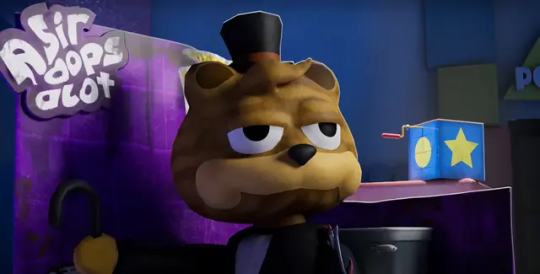


boxy boo was first teased before project was even announced.
the first image is from one of mobs minecraft animations, from august 27th 2022, months before project was first announced.
the second image is from the one year anniversary video, and you can see boxy's box next to huggys foot.
at the very end of the video, a dark image of boxy's box can be seen, as well as some numbers, likely the date of oct 31, which is when project was first teased for real.
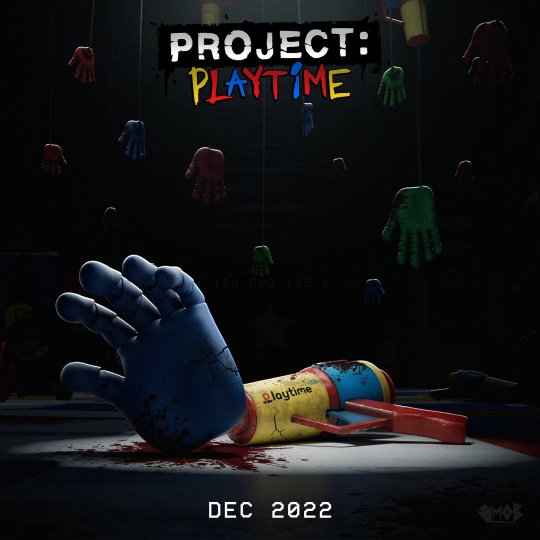
on october 31st 2022, project playtime was officially announced on the mob entertainment twitter. that wasn't the only thing announced here. inside this image was a code, a code that led to a FTP [file transfer protocol] server. this server was part of an arg that would lead up to project's release, called rowan stolls computer database.
the server is closed now, but all the information has been archived via the wiki
youtube
the ARG begins with this video, the first find when the FTP server was unlocked. this was paired alongside security 01 and 02, 2 gifs of security footage of the playtime co. facility. the rest of the files were password locked.
in this video, rowan stoll, the head of technology at playtime co., expresses concerns about there being possible nanny cams inside huggy wuggys eyes. this is the start of his skepticism towards playtime co. that come to light during this arg.
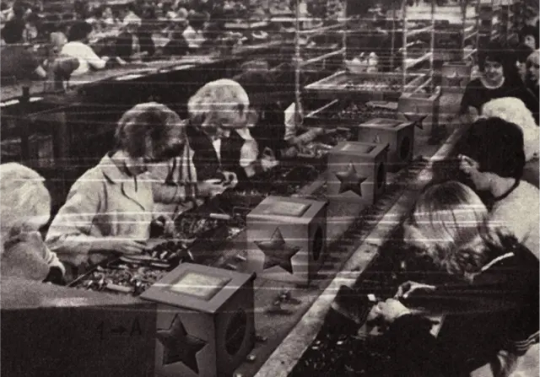

youtube
the second things unlocked started from an image posted by the playtime co. twitter account. this confirms boxy boo's creation date as a toy, which is during the 60s. featured in the image is a bunch of boxy boo toys being made by employees.
using this image, people were able to find a code, along with the remainder of the codes hidden in the twitter accounts for leith pierre, stella greyber, and eddie ritterman.
putting the code through an A1Z26 cipher yielded the results of "A_invenerunt_infernum", which translates to "they found it from Hell". this is referring to boxy boo, who will later be referred to as a hellspawn again in this arg.
combining this code with the date 05/28/91 gives us our second video. in it rowan stoll backtracks on his previous statements, presumably not wanting to get in trouble for questioning playtime co.
in this video, the password "Birth_place_11/28/67" can be found by listening quietly to the text to speech playing in the background. this password unlocks security footage 03.

playtime co. posted the employee safety rules video, which is related to the arg. the code "bcaebbefgd" could be found within this video, which leads to this twitter post by rowan.
in the background you can see boxy hiding.
apparently, playtime co. has been making rowan fix the puzzle pillars, revealing them for the first time. maybe this was his punishment for stirring up trouble.


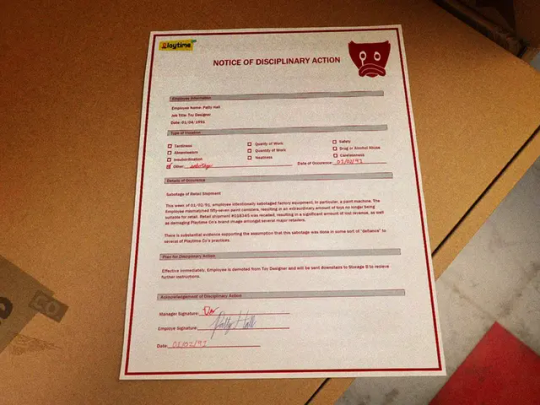
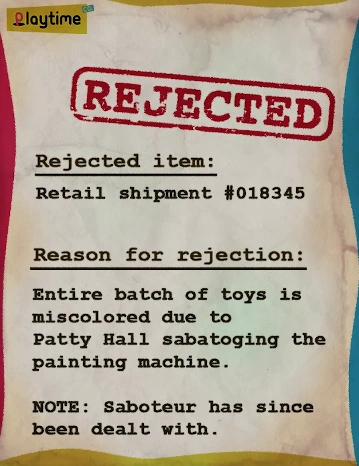
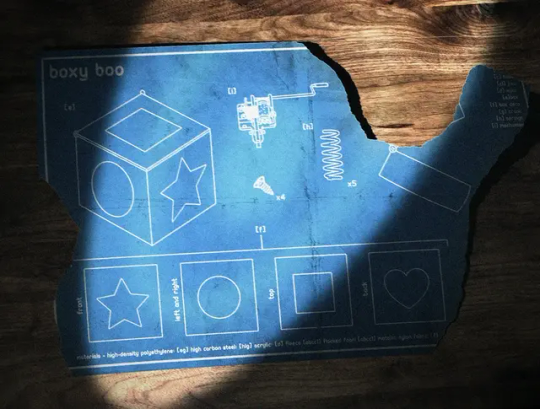

youtube
the playtime co. twitter account posted a new image, one of the train at the station. at the bottom of the image, credit is provided to playtime-co.com. going to this website leads to an email address, which gives a phone number. when called, you are immediately and indefinitely put on hold, and a piano tune plays.
around this time, rowan stoll posted about fixing the phone line, and adding the tune heard. using the piano notes heard in the tune itself gives the code "DEADFACEAFACADE", which can be translated to "Dead_Face_a_Facade". this is a password for a file called priv_doc01, which includes several things. a poster for boxy boo, a pinboard full of images, and a disciplinary note on patty hall.
patty hall is a character mentioned in chapter 2, in the rejects room. patty hall sabotaged a batch of toys by messing with the paint machine. in the disciplinary note, its mentioned that patty was sent down to storage b to "receive further instructions". remember this, it will be important.
the boxy boo poster contains a code, which unlocks rowan stolls third and final video log.
in this video, rowan expresses distress, thinking that playtime co. is going to kill him for finding out too much. he confesses that he is going to upload everything he knows and has found, which is what this FTP server is. he also says that playtime co. "has something that eats people alive", which we know is boxy boo.
rowan knew he was likely going to die, but put his last efforts into getting information about playtime co. out publically.
deciphering the strange static heard at the beginning through a spectrogram gives the password "diaboli_intra_buxum", which translates to "devil inside the box". the initial password can be used to unlock boxy boo's blueprints, as well as security footage 04, which depicts the project playtime theater map.
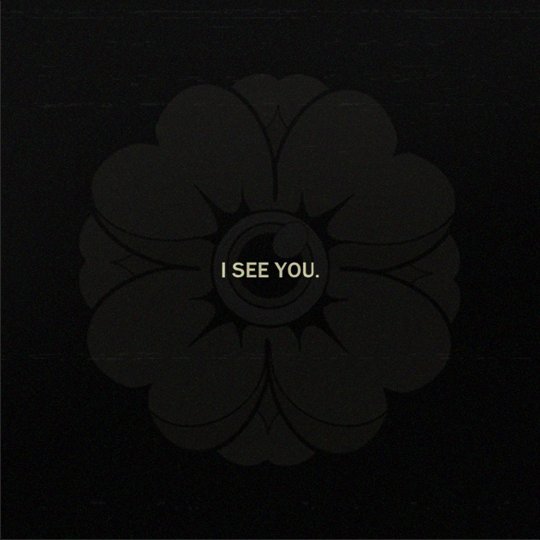
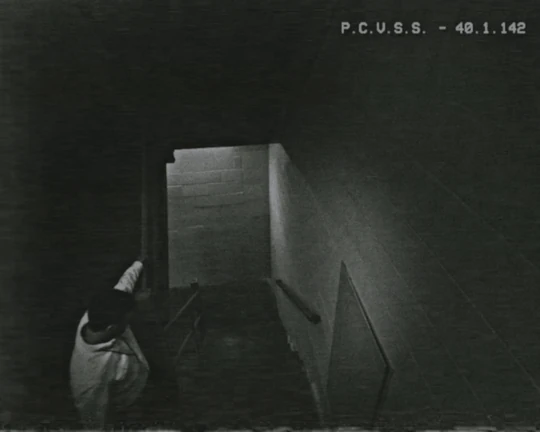
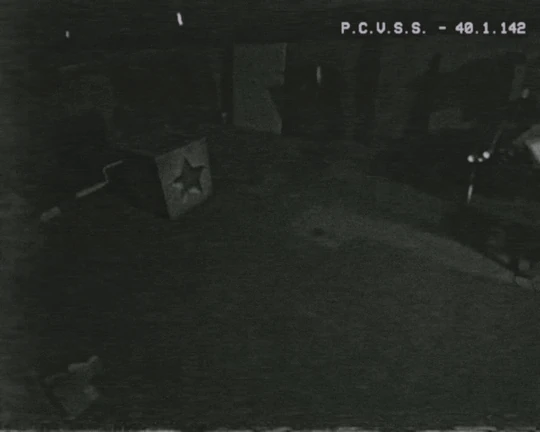
on november 22nd 2022, the FTP database went offline, leaving the rest of what rowan uploaded unknown. the playtime co. twitter uploaded a new post, with a single image of a poppy flower and the message "I SEE YOU".
each account that posted this image had letters hidden in their avatars and banners, each image containing broken morse code at the bottom. the morse within all the images translated to "caro est in aeternum", which means "the flesh is eternal".
the letters in each accounts banner and icons gave 2 different codes. "OVIHPKNABALZQZ", and "Play fair. Row: <- Column: ^, Filler: X. Innovation is key."
the answer was a play fair cipher, with innovation as the password. the cipher translated to "NOXFORGIVENESS", referring to rowan stoll.
a new account was created on the FTP server, and using the information gathered, access was granted. the username was "no_forgiveness" and the password was "caro_est_in_aeternum"
inside, was a singular file, titled "THIS_IS_WHAT_HAPPENS". showcased is the fate of rowan stoll.
it seems that playtime co. found rowans database, got rid of it, and replaced it with a message to anyone else who considers trying to expose or defy them.
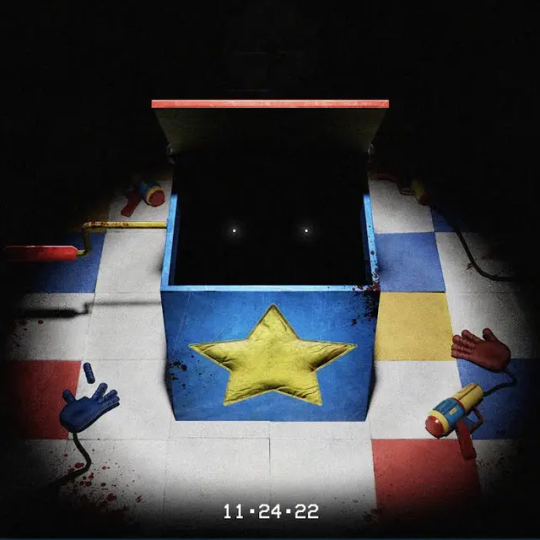
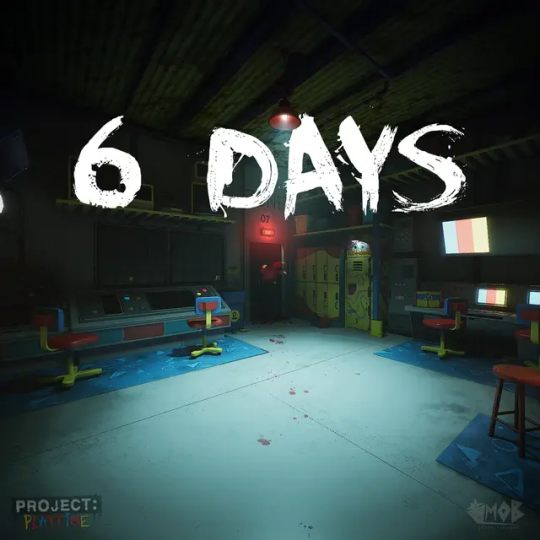
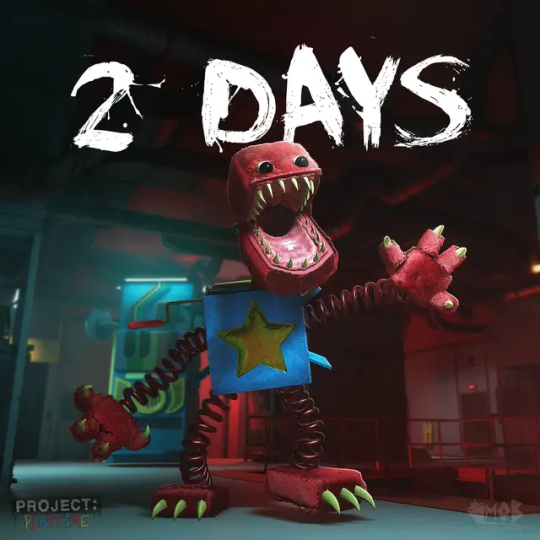

youtube
just two days after the arg ended, on november 24th, the cinematic trailer for project playtime was released, and boxy boo was finally revealed. just a day later, a gameplay trailer for the game released.
counting up till the release of the game, teaser images were posted, giving us even more of boxy.
youtube
even after projects release, boxy boo's story was not finished. over the course of project, 2 tapes were added into the game.
the first introduces us to harley sawyer, a major player in the bigger bodies initiative. he is mentioned many times after this initial introduction, including in chapter 3 and the chapter 3 arg.
in the first tape, harley sawyer talks about the bigger bodies initiative, whose intention was to replace workers with living toys. he believed this would cut down on lawsuits and losses, as well as take care of insubordinate employees.
in the second tape, harley sawyer visits boxy boo for the first time. boxy boo is the first successful bigger body created as confirmed by harleys own words. harley says that they need to "tailor your [boxy's] appetite to flesh", and asks for an update on rowan stoll.
this is obviously leading up to rowans fate in the arg where boxy killed him.
youtube
boxy boo appears several times after this, in restricted_restoration, being the monster that attacked thomas. you can hear the sound of his music box winding up before the attack, and his paw and roar when he actually attacks him.
he also features in chapter 3, both as cutouts and murals, and in the hour of joy, as featured above.
BUT WHAT IS BOXY BOO'S PURPOSE?
boxy boo was the first successful bigger body, created in 1991. after his toy, created in the 60s, failed to become as popular as other mascots, harley sawyer found a new purpose for him.
boxy boo's purpose is not to play with kids, or even be around people at all. his purpose is to kill insubordinate employees. he killed patty, and he killed rowan. this is why harley wanted him to learn to become accustomed to flesh. he wanted boxy to be hostile from the beginning.
boxy was never meant to be around people. he was meant to have employees sent down to him to be eaten when playtime co. deemed them deserving of it. thats what happened to rowan and patty. the devil in the box ate them.
#poppy playtime#poppy playtime chapter 3#poppy playtime boxy boo#boxy boo#project playtime#rowan stoll
25 notes
·
View notes
Text
Generation Alpha are the most difficult generation in the history of education
I have attempted to go into education TWICE. When I first started student teaching (2016), I noticed behavioral issues in the 4th graders that I was teaching. I witnessed a 4th grader tell another teacher that she was NOT going to be doing the assigned reading, and if the teacher didn’t like it, she would tell her mom and her mom would have her fired via the school board. Children were noticing power dynamics, even then. Parents would rather have educators lose their livelihood than creating a possible confrontation with their children, over the concept that adults are authority figures worthy of respect. I continued with my education program, but I did not get licensure. Even then, school administrators took the side of parents/students and distributed limited disciplinary actions, citing the school-to-prison pipeline. Even when these students were a PHYSICAL danger to not only well-behaved students, but their teachers as well.
Millennial parents were raised by the overly strict, irrational boomers. They aren’t even realizing that they’re creating the same entitlement within their own children, simply through emotional unavailability and lack of structure. Parenthood is more than cute photos for Facebook and Instagram, and many millennials that I know had children wayyyy before they were ready. Gentle parenting is entirely different than PASSIVE parenting. Difficult conversations, tears, and learning experiences are all a part of childhood. Mind-numbing technology does not make developmental requirements go away. Generation alpha has been stripped of the true opportunity to learn and develop. Learning opportunities have been replaced by mind-numbing technology. These tablets produce the same responses in the brains of these children as DRUGS. That is why they can’t focus on school. Imagine taking a drug away for 8 hours, and being expected to learn more information when you were not even set up for success since being a toddler. The expectations seem unfair to them, understandably. They’re children, and new to many things. Millennial parents do not generally have knowledge on childhood development, and what are developmentally appropriate behaviors vs inappropriate behavior. Your child does not need to see a doctor, YOU need to sit with them and identify their emotional and behavioral patterns. Not every child needs medication, but all children need discipline and structure. That requires uncomfortable emotions, from both parent and child. There are times where you and your child will not be “friends”.
Generation alpha doesn’t retain information because they go home, and are handed a tablet. They have 0 social skills because they do not have many opportunities for socialization. Not even from their parents. Many of their social opportunities are with OTHER kids who also have extensive internet access to inappropriate and mindless content. I know middle school teachers who teach 6th graders on a 1ST GRADE READING LEVEL. No more than 2 parents even show up to parent teacher conferences. Parents are unresponsive via emails and phone calls. These kids are being set up for poverty. Respect, reading comprehension, and following directions are essential for even retail and restaurant careers.
Gen-Z does not use nearly as much technology in parenting. We were the first generation with unrestricted Internet access. We have seen horrible things on the internet. My best friend and I watched someone get beh***ed at 11 years old. We also watched our parents (Gen X) become emotionally unavailable due to technology and social media. Our hobbies, interests, and achievements were reduced to Facebook and Instagram likes. Gen Z understands the importance of QUALITY TIME in parenthood. Gen Z is not having children, because we take it seriously. We understand how hurtful it is to not be heard by our parents. We understand how awful the internet can be. We understand social media’s unfair and unrealistic expectations on the youth.
Charlottesville High School in Charlottesville, VA has had multiple days of classes cancelled due to a teacher walkout. There have been multiple VIOLENT fights that have broken out. A teacher was seriously injured not even 2 weeks ago. A suspension for these students hasn’t even been handed out. We need to protect educators (the very few that we still have) and students who show up willing to learn.
37 notes
·
View notes
Text
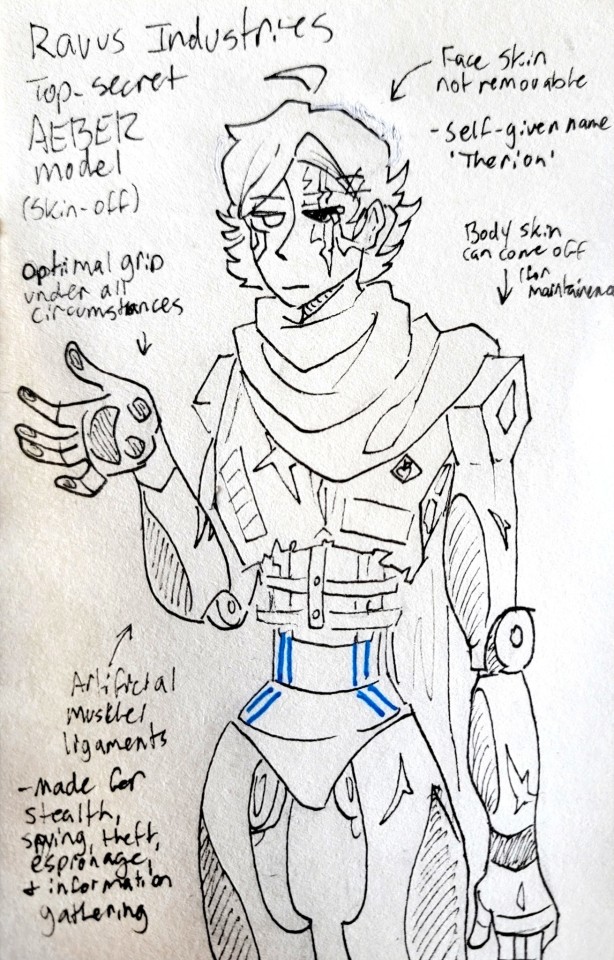
Heehee hoohoo Theriandroid design :)
TOP SECRET - AUTHORIZED PERSONNEL ONLY
Ravus Industries product- Unique Frame AEBER model, serial no. XXXX1069
Status: Decommissioned. Missing, assumed deactivated or scrapped. [OUTDATED - SEE ADDENDUM FOR FURTHER DETAILS]
Model is pictured here with artificial skin removed and hair pulled back to examine eye socket after last authorized maintainence. Please note that artificial skin affixed to the neck upwards is not removable to protect sensitive sensory and motor components.
The AEBER model was constructed in secret to conduct information and asset retrieval on behalf of Ravus Industries. Purposes they have been successfully utilized for include: stealth, espionage, theft, assassination, and information gathering. The android was given highly advanced artificial intelligence with a focus on visual cognition and quick decision making in order to facilitate this purpose. Identity formation is a known result of AI tuned past a certain threshold, and as a result the unit self-identifies as 'Therion', and should be referred to with 'they/them' and 'he/him' pronouns.
Physical features include a unique lithe build and highly maneuverable joints as well as extra artificial muscle and ligaments in order to provide maximum flexibility, agility, and speed. Fingertips, palms, and the soles of the feet are padded with specially textured carbon fiber and fitted with electromagnets that the AEBER model can activate at various intensities. This is to ensure optimal grip and balance at all times. All extremities are also fitted with individual adjustable counterbalances for this purpose.
Unit was decommissioned April 301X due to disciplinary issues and obsolescence.
ADDENDUM
Addendum 1: AEBER unit, aka 'Therion', has refused a programmed assignment. The unit's ability to refuse tasks is a new development and will need further study.
Addendum 2: After reconditioning, unit is no longer refusing tasks. Unit expresses great distress when given assignments involving assassination. Due to reasonable conflicts with ethics programming, concerns can safely be ignored.
Addendum 3: Unit is refusing orders once more, reconditioning unsuccessful. Due to development of newer AEBER model ('Gareth') and conclusions of Ravus Industries Artificial Intelligence Ethics Board, 'Therion' is scheduled to be decommissioned and placed in long-term storage.
Addendum 4: AEBER unit 'Therion' has been lost after a break-in of the Ravus Industries long-term storage facility, along with several other non-intelligent assets. Unit has deactivated or damaged their internal GPS and cannot be located by satellite. Proprietary technology and the top-secret nature of this unit dictate that location and re-acquisition are a priority.
Addendum 5: Unit has been located in the Cliftlands area after checking in to a Ravus Industries authorized engineering location for repairs. Unit seems to have taken heavy cosmetic damage and lost one visual sensory component. Diagnostics indicate that they are otherwise healthy.
Addendum 6: Search of the Cliftlands has turned up no trace of 'Therion', and unit has not been seen or recorded in any locations for the past six months. Human testimony has also turned up no leads, with no sightings within the same 6-month time frame. Unit is currently listed as missing, assumed deactivated or scrapped as of August 302X.
Addendum 7: Unit has been sighted in the Riverlands as of March 303X, six years after being listed as missing. Retrieval is once again considered a priority for this unit after the loss of 'Gareth'.
#spitblaze says things#spitblaze draws things#spirblaze writes things#octopath#octopath traveler 2#therion#therion (octopath)#android therion au
44 notes
·
View notes
Quote
Prisoners, asylum seekers, drug addicts and other marginalized people are the involuntary early adopters of every form of disciplinary technology. They are the leading indicators of the ways that technology will be ruining your life in the future. They are the harbingers of all our technological doom.
Cory Doctorow
10 notes
·
View notes